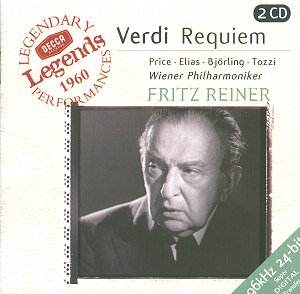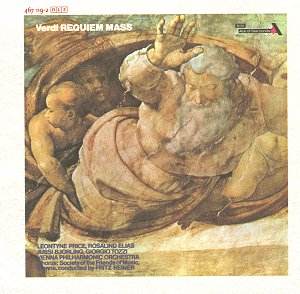VERDI
Requiem
 Leontyne
Price Soprano Rosalind Elias Mezzo-Soprano Jussi-Bjorling
Tenor Giorgi Tozzi Bass
Leontyne
Price Soprano Rosalind Elias Mezzo-Soprano Jussi-Bjorling
Tenor Giorgi Tozzi Bass
Singverein der Gesellschaft der Musikfreunde, Vienna
Vienna Philharmonic Orchestra Fritz Reiner Conductor
VERDI
Four Sacred Pieces
 Yvonne Minton
Mezzo-Soprano
Yvonne Minton
Mezzo-Soprano
Los Angeles Master Chorale Los Angeles Philharmonic Orchestra
Zubin Mehta Conductor
 DECCA
CD1 467 119-2
DECCA
CD1 467 119-2
Crotchet
Amazon
UK

These CDs have been issued by Decca in their "Legendary Performances" series;
the recording was originally issued on the Ace of Diamonds label in 1960.
Fritz Reiner belonged to that era of revered authoritarian conductors (including
Toscanini, Klemperer and Beecham) who dominated the pre-Second World War
orchestral scene. His reputation was achieved very largely through his
interpretations of Wagner opera in America and Europe and his orchestral
directorships in Cincinnati, Pittsburgh and Chicago. This recording of the
Verdi Requiem came towards the very end of his conducting career and
only 3 years before his death. George Hall's accompanying notes contrast
Reiner's reputation for "military precision" with his observation that this
account of the Requiem is "not the most precise version on disc",
and draws attention to just how much slower many of his tempi are compared
to those indicated on the score by Verdi. To discuss this point further,
it is worth setting out the full set of tempi (in beats per minute) as performed,
followed by Verdi's metronome markings in brackets:
Requiem aeternam Andante 36 (80) Te decet hymnus Poco piu 58
(88)
Dies irae Allegro agitato 80 (84) Tuba mirum Allegro sostenuto
80 (88)
Mors stupebit Molto meno mosso 56 (72) Quid sum miser Adagio
90 (100)
Rex tremendae Adagio maestoso 52 (72) Confutatis Andante 70
(96)
Lacrymosa Largo 50 (60)
Offertio Andante mosso 40 (66)
Sanctus & Osanna (fugue) Allegro 112 (112)
Agnus Dei Andante 66 (84)
Lux aeterna Allegro moderato 57 (88)
Requiem aeternam Andante 43 (80)
Libera me (fugue) Allegro 92 (116).
Perusal of these figures justifies the conclusion that, with few exceptions,
the tempi are indeed slow. However, it is also true that Verdi's indicative
markings are mostly faster then we are accustomed to hearing them - I would
be willing to wager that modern performances never match them in all sections.
The places where Reiner's tempi are plodding, laboured and really drag are
the opening Requiem aeternam and the Te decet hymnus. The reprise
of Requiem aeternam just before the final Libera me fugue is
indeed cruelly slow for the soprano soloist, wondrously sustained as the
singing of Leontyne Price is in this most technically demanding of passages.
To maintain such perfect intonation for so long a time unaccompanied,
as she does, is a true test of greatness. For the rest, the tempi
do not feel slow - it is simply a matter of the putting impatience
aside and entering into the whole spirit of the performance. The listener
who does this is richly rewarded: the tempi allow him to savour the glorious
sensuality of Verdi's melodic lines and experience their spiritual depths.
Verdi wrote multitudinous and remarkably detailed instructions in the score
of the Requiem, indicating that he had a very precise idea of exactly
how the finished product should sound. It is in his strict fidelity to Verdi's
markings that Reiner's rhythmical precision and textural clarity serve, rather
than detract from, the emotional intensity of the music. The whole of the
Dies irae and Offertio merit repeated playings, as each time
more and more detailed nuances become manifest to the listener - subtleties
that all too often get washed over in performance.
At the same time there is no lack of apocalyptic fire and thunder. The Dies
irae, Tuba mirum and Rex tremendae depict awe-struck terror with
as much impact as may be heard on any recording. We may also note that the
Reiner is fully up to speed on the Allegro movements, including a glitteringly
precise rendering of the Sanctus double fugue.
Reiner's interpretation enjoys the wholehearted cooperation and participation
of the internationally renowned quartet of soloists - each of them having
"star" status individually, but also engaging in superb ensemble singing.
The recording engineers also merit commendation for faithfully reproducing
the extremes of dynamic range, with the pppp passages remaining clearly
audible, whilst avoiding distortion when the fff sections are blasting
at maximum, thereby heightening the dramatic impact of the whole performance.
As a bonus, these CDs include the Four Sacred Pieces, originally recorded
ten years later under the baton of Zubin Mehta. The unaccompanied singing
of Los Angeles Master Chorale is a particular joy here and Yvonne Minton
acquits the soloist lines with just the right mix of serenity and intensity.
The combined forces in the Te Deum provide a deeply satisfying culmination
of the whole work. These pieces should perhaps be listened to separately
from the Requiem, being as they are closer to the ecclesiastical
liturgical musical tradition (albeit they are usually performed in the concert
hall), whereas the Requiem is much more operatic in style, and requires
a switch of mind set.
These CDs can be heartily recommended for both Verdi afficianados who relish
an alternative to more conventional renderings and also for first time listeners
who seek a thoroughly authentic introduction to Verdi's greatest choral music.
Humphrey Smith



